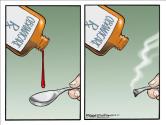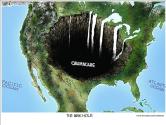I’ve shared several videos that make the case against Obamacare.
Here’s one narrated by a Dutch woman warning that America shouldn’t repeat  the mistakes of European government-run healthcare.
the mistakes of European government-run healthcare.
Here’s one from Reason TV about how free markets produce lower healthcare costs.
Here’s one explaining the need to deal with the government-caused third-party-payer crisis.
And I had to reluctantly admit that even one of Karl Rove’s group produced an effective video on Obamacare harming young people.
Recommended
I think all of those videos are well done and contain critical information, but I suspect the humor in this clever video may change even more minds. Or at least it will be more widely watched.
Fortunately, the creepy Uncle Sam is only symbolic at this stage. While Obama probably would prefer a single-payer system like the one in the United Kingdom, where doctors and other medical personnel actually are government bureaucrats, the immediate danger is that Obamacare will turn health care professionals into agents of the government.
And the politicians will then direct doctors and others to collect information that the government shouldn’t possess.
If you think I’m exaggerating, read some of the chilling details from Betsy McCaughey’s recent New York Post op-ed.
‘Are you sexually active? If so, with one partner, multiple partners or same-sex partners?” Be ready to answer those questions and more the next time you go to the doctor, whether it’s the dermatologist or the cardiologist and no matter if the questions are unrelated to why you’re seeking medical help. And you can thank the Obama health law. …The president’s “reforms” aim to turn doctors into government agents, pressuring them financially to ask questions they consider inappropriate and unnecessary, and to violate their Hippocratic Oath to keep patients’ records confidential. …Dr. Richard Amerling, a nephrologist and associate professor at Albert Einstein Medical College, explains that your medical record should be “a story created by you and your doctor solely for your treatment and benefit.” But the new requirements are turning it “into an interrogation, and the data will not be confidential.”
I don’t like the idea of government bureaucrats having my private information, but what’s probably most worrisome about this Obama Administration scheme is that the data won’t be confidential.
 As McCaughey writes, it’s just a matter of time before hackers or incompetent bureaucrats make that information public.
As McCaughey writes, it’s just a matter of time before hackers or incompetent bureaucrats make that information public.
Patients need to defend their own privacy by refusing to answer the intrusive social-history questions. …Are such precautions paranoid? Hardly. WikiLeaker Bradley Manning showed how incompetent the government is at keeping its own secrets; incidents where various agencies accidentally disclose personal data like Social Security numbers are legion.
Do you want details about your sex life put at risk of disclosure? That’s what this issue is all about, not to mention the fact that what we do behind closed doors is none of the government’s business.
And I’m sure you’ll be delighted to know it’s not just data about your sex life that will be available for bureaucrats and identity thieves.
Here’s what Senator Orrin Hatch of Utah recently wrote.
Individuals signing up are required to provide personal information such as Social Security numbers, tax returns and household income information that will be entered into the Federal Data Services Hub (Data Hub) — a new information sharing network that allows other state and federal agencies, including the Internal Revenue Service (IRS) and the Department of Homeland Security, to verify a person’s information. The problem? …Last month the department of Health and Human Services Office of Inspector General (HHS-OIG) issued a report saying the federal government had failed to meet multiple deadlines for testing operations and reporting data security vulnerabilities involved with the Data Hub. …The repercussions of opening the exchanges with an unproven security system could be devastating, putting the personal and financial records of millions of Americans at the fingertips of data thieves. Other government certified systems have already proven to be less than reliable in protecting personal information. Look no further than the accidental release by the IRS this past July of thousands of taxpayer Social Security numbers on its website. …we can’t stand on the sidelines and let the Administration potentially expose the personal data of millions of Americans to more fraud.
By the way, everything written by McCaughey and Hatch also helps to explain why we should resist privacy-destroying schemes such as the Internet sales tax cartel being pushed by greedy politicians.  I know I wouldn’t want all my online purchases in a database where state and local bureaucrats would be able to snoop for details.
I know I wouldn’t want all my online purchases in a database where state and local bureaucrats would be able to snoop for details.
And we also should oppose international tax harmonization schemes that are predicated on governments all over the world collecting and sharing private information about our finances. That kind of data would be a gold mine for hackers and identity thieves, not to mention there are huge risks of making that information available to corrupt, incompetent , and venal governments.
The common theme is that we shouldn’t let government have more information about us, particularly when the politicians want that data to pursue bad tax policy or bad health policy.


